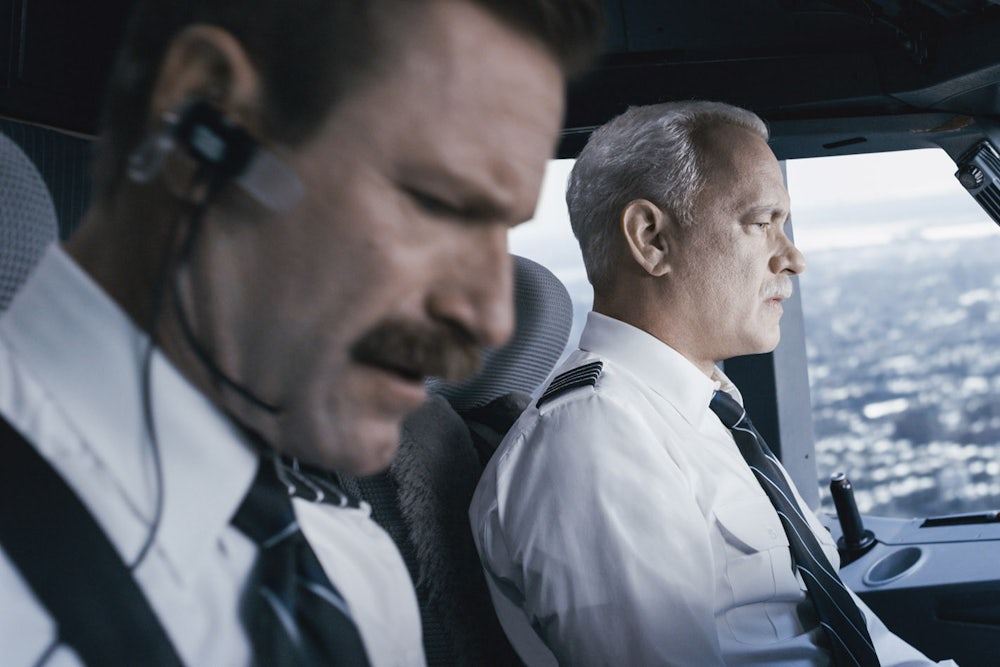One of my favorite Norm MacDonald moments comes from The Conan O’Brien show in 2009, just a few weeks after Captain Chesley “Sully” Sullenberger landed US Airways Flight 1549 in the Hudson River when its engines were taken out by a flock of Canadian Geese. MacDonald explained in the bit that he had years ago met Sullenberger “in an airport Sbarro’s” and was so impressed with the man that he bought Sully’s life story on the spot. MacDonald told Conan he’d just wrapped a movie about the pilot, but was worried that, with the recent landing, he might have just missed the most important part. “It’s a shame. I was struggling for an ending for a long time.” The joke was obvious: Check it out, some schmuck is going to try to make a movie out of this Sullenberger character someday, even though the only interesting thing that ever happened to him lasted 208 seconds. The rest is all Sbarro’s.
That schmuck, as it turns out, is Clint Eastwood. And it is worth noting that in Sully, Eastwood and his star Tom Hanks haven’t necessarily solved the problem of how to make the pilot’s story all that compelling. Eastwood attempts to dress up the narrative with some human-nature-vs-the-cold-efficiency-of-technology mumbo-jumbo; there’s also a contorted attempt to pretend there was a moment when spineless bureaucrats believed Sully was anything other than an heroic figure. The drama outside of the “Miracle on the Hudson” itself is minimal: There’s a flashback scene in which Sully lands a fighter pilot under difficult circumstances, some stressed phone calls to Sully’s wife (Laura Linney, who doesn’t share the screen with Hanks once) and many, many scenes of Sully jogging through Times Square looking overwhelmed. None of these add up to much; they seem to exist solely to pad the running time to a just-barely-made-it 96 minutes. The only real reason we care about Sully is what happened in that plane. In that regard, and only that regard, Sully absolutely delivers.
Eastwood smartly intersperses the doomed flight throughout Sully’s narrative; we see different aspects of it from different angles at different times. There are Sully’s nightmares in the days afterward, truly terrifying scenes in which he attempts, after the engines fail, to return to LaGuardia only to crash instead in midtown. We see the split-second decisions Sully and his co-pilot Jeff Skiles (Aaron Eckhart) had to make before the fateful decision to land in the Hudson. We see the landing itself, which seems impossible, not just because you’re landing a plane on the Hudson River but also because it was a freezing mid-January day and passengers only had a matter of seconds to evacuate. Because the plane landed, and because it happened so quickly—remember, the first time any of us even knew about this was because onlookers started posting pictures of the passengers out on the wings on Twitter—we collectively never quite comprehended the calamity that Sully and his passengers faced, and just how much skill, intuition, and experience were required to save lives. Sully makes it clear, this really was a miracle. You know, intellectually, the plane lands and everyone survives—but it sure doesn’t feel that way when you’re watching it.
Another thing Eastwood gets right is how New York City, desperate for something to cling to in the wake of the 2008 financial collapse a few months before, took to Sully as someone to rally around, a true hero in a world full of con men and grifters. There’s a funny scene in which Sully, on one of his anguished late night jogs, pops into a generic Irish bar and is toasted by barflies who can’t believe he’s right there in front of them. (They’ve even named a drink after him—a Grey Goose shot with a splash of water.) There was something about Sully, something fundamentally decent and unassuming, that we could all rally around. Here, played by Tom Hanks, our patron saint of fundamental decency, it’s easy to find yourself quietly stirred by his resistance to the spotlight. Sully is bewildered by the strangers who keep hugging him—he’s nonplussed to spend his first night as an American hero at a dingy airport Marriott— and his ordinariness and plodding dullness is the center of the film. He’s a hero because he’s a plodder like the rest of us.
While Eastwood isn’t quite able to stir decency into rousing drama—a subplot about an NTSA investigator who is skeptical of Sully’s need to land in the Hudson feels unnecessary—he keeps the story moving and he keeps it short. Eastwood never forgets the real drama is on board the plane. Norm MacDonald understood it first: Sully isn’t a fascinating enough of a character to hold up as the protagonist of his own biopic, no matter how much you try to dress it up. (On Conan, the entirely of MacDonald’s “film” about Sully is a routine one-sentence rendezvous with air traffic control.) Sully works best when it drops its dramatic pretense, focusing instead on those 208 incredible seconds. At one point, Sully laments that his long aviation career will be ignored, and he will only be judged upon those seconds. Yes, but what seconds to be judged upon.
Grade: B
Grierson & Leitch write about the movies regularly for the New Republic and host a podcast on film. Follow them on Twitter @griersonleitch or visit their site griersonleitch.com.
